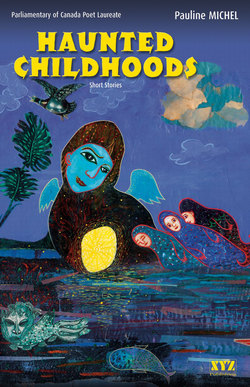Читать книгу Haunted Childhoods - Pauline Michel - Страница 6
На сайте Литреса книга снята с продажи.
The Tipping Chair
ОглавлениеI was five years old. I remember the kitchen so well I could be there now. White walls. Sitting on grey tiles, still as a doll... so still they forgot about me listening, like a dog vanishing behind its eyelids.
I watched my brother muttering such horrible words through the green clay mask over his dark, deathly mouth...
“Life,” he said, “leads nowhere, like a nightmare that never ends”
Eyes closed, he didn’t see me. He was talking to our mother, who shot back, “Lord, André, life on this earth doesn’t matter. It’s just to prepare us for the next one, for eternity. You can’t give up!”
Eternity trembled between their eyelids. I saw it and suffered for not being there.
He didn’t budge, so the mask wouldn’t crack. I didn’t budge either. I didn’t want any movement to scream out my presence.
Sitting on a chair, its back against the wall, back legs on the floor, front legs hooked on empty air, an uncertain balance... no, a certain imbalance. Always been that way, I suppose, at least since I was born.
“Can anyone make it across that whole dark country, through a whole dark life?” he asked her, “Why this cyclical circus that never stops? Always one more child inside you to be born, Mother, and always an older one who must be sacrificed for the new. With each birth, I give up another of my longings, whether it’s my studies or moving away. I’m a second father to every child you have, Mother. Every time your belly swells, it weighs on my heart and on my back... I feel responsible for everything Father does and for this stifling religion of ours. So many children, so much ignorance and blindness!”
I knew I should never have been born, and tried to find a way to be forgiven for it.
Still I loved him, this brother of mine, whenever he took off his mask and landed flat on the ground.
One day, he spotted me sitting there and said, “You didn’t hear any of that, did you?”
I didn’t say a thing, just pretended to go on playing, so he wouldn’t feel any guiltier than he already did, which was too much. Always had, I suppose, since he was the eldest in a family that just went on and on.
“Maybe childhood will finally find a way into that belly,” I thought, looking at my mother or the empty cradle in the storeroom.
I so often imagined my father’s awful, hairy sex penetrating my mother’s and making brothers who would grow up, one after the other ask awkward questions, hiding under green masks and frightening kids who tried to vanish behind their eyelids, pretending not to be there.
Once upon a time, there was an ostrich who saw unspeakable things when he stuck his head you-know-where...
The five-year-old me, a little girl who started to have nightmares, seeing herself run around all night long, enough sand in her mouth to suffocate her and plenty in her eyes from looking where she shouldn’t, so they cried salt water like the sea, like the mothering ocean she had tasted in the belly, lay doubled up so as not to be propelled onto the kitchen floor and hear things she must never repeat.
One day, something happened that the little-girl me did not understand. Whether the kitchen wall receded and the chair tipped over... she didn’t know how, but her brother had vanished. Was life going to be like that? Does life just disappear into thin air when it’s not there for us to see?
She never saw him again, not him or his green mask. All that remained of her brother was a question. This little girl ran through the kitchen looking for his way out, the wall that sank out of sight, the hiding-place where we become invisible.
She ran with question marks curled around her heart, clutching it like fists, as she’s been doing for forty years now, trying to crack the masks of liars and escapers and undertakers. Yet she undertakes life for all it’s worth. She savours it but barely dares to speak for fear of cracking all the green masks she’s put on. Unmask? Sure! Crack? Well, no.
She runs across the stage, on a high wire, over the backing of mirrors, to track time’s wrinkles and the skin falling from a skeleton that will tip over...
She goes on telling stories to calm children, to give them courage to go on.
The clown in her reaches for their laughter at the edge of space, beyond the sperm of their fathers or the salt water of their mothers, beyond tears or rain, beyond a gold-lit sun that, perhaps, looks like eternity or her vanished brother.
And they tell the girl walled up in a forty-five-year-old woman that childhood is a time of sweet bliss.
